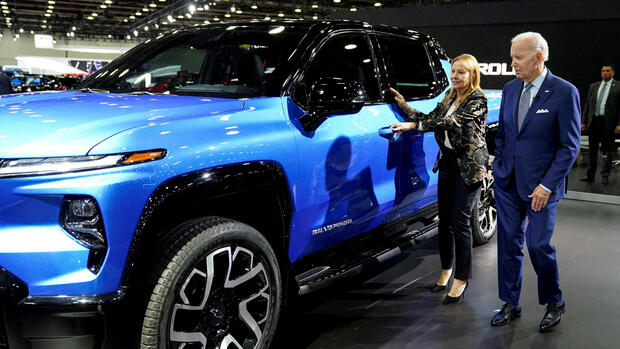Washington, New York In the USA, the auto industry is threatened with a large-scale strike, which the United Auto Workers (UAW) union has called for this Friday. Two years after the supply chain crisis in which American auto factories had to cut production, work stoppages could now slow down production.
Initially, only “limited and targeted” work stoppages are planned at the major Detroit car companies Ford, General Motors and Chrysler parent Stellantis. However, UAW boss Shawn Fain did not rule out nationwide strikes by the nearly 150,000 union members.
On Friday night, negotiations over higher wages and improved working conditions failed for the time being. Several US Congress representatives, including the left-wing Senator Bernie Sanders, want to travel to the auto metropolis of Detroit on Friday for a rally to support the concerns of the unionists.
It is the first time that the union has called for work stoppages at all three companies. A US auto manager, who did not want to be quoted by name, told the Handelsblatt that he was initially assuming strikes in transmission factories or production facilities that produce electric motors.
Shortly before a UAW ultimatum expired, Ford warned: “The future of our industry is at stake. Let us do everything we can to avert a catastrophic outcome.” Virtually no workers at foreign manufacturers’ plants are members of the Detroit-based union. The factories of Tesla, the largest American electric car manufacturer, are also not unionized.
Widespread strikes cannot be ruled out.
(Photo: Bloomberg)
German car manufacturers also emphasized that they were not affected due to the lack of union organization in the southern states. Both Mercedes-Benz, BMW and Volkswagen have their largest US plants in the southern United States, not in Detroit.
Strike by US automakers could put states “on the brink of recession.”
Nevertheless, it cannot be ruled out that the wave of strikes will indirectly affect foreign companies and put a strain on the US economy as a whole. If the work stoppages are limited to a few days or weeks, the industry could cushion the strikes, said Mark Zandi, chief analyst at Moody’s.
But major car shortages, Zandi said, could boost inflation and longer strikes could affect suppliers across the country. There is also the possibility of another “shutdown” of the US government if the US Congress does not agree on a budget by the end of September.
If the strike continues through the end of the year, Zandi said, “it would be enough to put the economy on the brink of recession, considering everything else that’s happening.”
>> Read also: “Getting out of the swamp on your own head” – How the US economy depends on Europe
A full-scale strike that shuts down all production would cause a $400 million to $500 million drop in profits per week for each affected automaker, according to Deutsche Bank estimates.
The strike throws US President Joe Biden into a dilemma. On the one hand, his government is massively supporting the auto industry with tax incentives and e-car loans in order to accelerate the transition to electric mobility. On the other hand, Biden is dependent on the favor of hundreds of thousands of workers in the vehicle industry who manufacture in strategically important states.
“We will transition to an electric vehicle future made in America – and that will protect and grow good union jobs,” Biden wrote on X, formerly known as Twitter.
America’s car manufacturers should play a central role in achieving climate goals.
(Photo: Bloomberg)
The Midwest of the USA sometimes votes Democratic, sometimes Republican and will therefore have a say in the outcome of the 2024 presidential election. These include Michigan, Wisconsin and Ohio, states with a lot of vehicle production and suppliers.
Hurdles for Biden’s electric car boom
Biden says he is “the greatest pro-union president” of all time. However, there are doubts within the unions about the electric car boom, one of Biden’s most important campaign promises. They fear that the transition to e-mobility will lead to fewer jobs and lower wages, favoring non-union companies like Tesla and shifting production to southern states where there are hardly any unions.
The workers’ protest highlights the potential obstacles to Biden’s policies. The president has announced that two-thirds of new car sales in the USA should be electric by 2032 – an ambitious goal. The U.S. government has spent billions to promote sustainable technologies, which has spurred green investments across the country.
>> Read also: Tesla rival Rivian is aiming for Europe – with new factories and an SUV for $40,000
America’s automakers should play a central role in achieving climate goals by producing significantly more electric vehicles. GM, for example, plans to have one million electric vehicles rolling off the assembly line by 2025.
The UAW is now pushing for those workers who produce batteries and other e-components to also benefit from better wages and working standards. Biden had unsuccessfully lobbied Congress to ensure that car giants could only benefit from the incentives if they increased wages and improved working conditions. The UAW strike is now intended to force the companies to do so retroactively.
The UAW is one of the few unions in the US that has not yet supported Biden’s re-election ambitions. Unions are playing an increasing role in the election campaign: US President Donald Trump has announced that he wants to fight for the approval of the UAW and accused Biden of driving the country “to ruin”.
More: New Report – Poverty Rate in US Rises Dramatically
